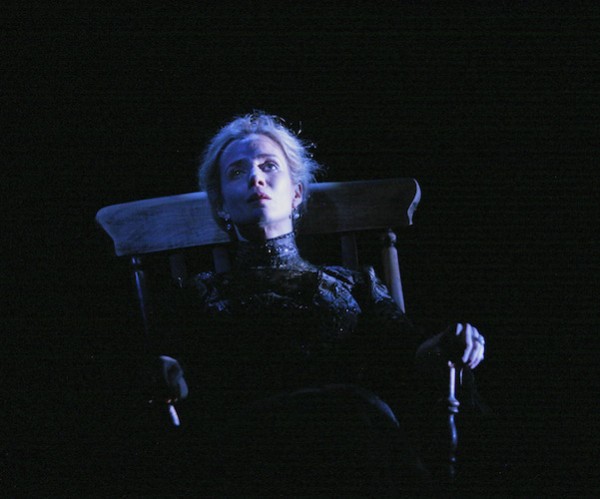Theater Review: Samuel Beckett — A Memorable Voice in the Dark
Lisa Dwan’s performance of these short Samuel Beckett plays in a totally darkened theater is powerful and, in the case of a fabulously quicksilver Not I, deliciously revelatory.
A Beckett Trilogy: Not I/Footfalls/Rockaby by Samuel Beckett. Performed by Lisa Dwan. Directed by Walter Asmus. Presented by ArtsEmerson at the Paramount Mainstage, Boston, MA, through March 20.

Lisa Dwan in “Rockaby.” Photo: John Haynes.
By Bill Marx
World enough and time … given my current academic and editorial demands, my world feels as constricted as those of the forlorn figures in Samuel Beckett’s Not I/Footfalls/ Rockaby, a trio of plays that dramatize the attenuated consciousnesses of females riffing, rocking, or stepping along the knife’s edge of oblivion. So I can’t give this powerful evening the carefully detailed reaction that it so richly deserves. Suffice it to say that Lisa Dwan’s performance of these Beckett pieces in a totally darkened theater is powerful and, in the case of a fabulously quicksilver Not I, deliciously revelatory. She is not — as one overenthusiastic critic would have it — channeling the playwright from the beyond (there is a crucial element of death’s head humor missing), but she is adroitly alive to the verbal and metaphysical nuances of these somberly lyrical pieces.
Compounding my regret is that Dwan seems to be a take-no-prisoners actress after my own heart. She argues in the ArtsEmerson program notes that “Beckett has shown me that sentimentality isn’t truthful – it is the language of gangsters.” What is surprising is that these professionally soothing ‘gangsters’ can be found everywhere on the current cultural scene, both in and out of the temple of art – it is not just your usual moneymen, but ‘serious’ artists and journalists who embrace the idea that the duty of the theater is to dispense supposedly life-giving sugar in the form of immersive entertainment, musical pieties, or political point-scoring. Complex or disturbing truths are glossed over for our own good (of course); this is the rise of corporate culture as a form of exhilarating escapism, doses of glucose-medication ladled out to audiences who don’t want to look at the world (and its depressing state) too closely.
Beckett will have none of this puerile uplift, though his rejection comes with a liberating sense of gallows humor. It is that energy, perhaps the result of a release from the constrictions of mundane existence, that Dwan gets at in her zesty version of Not I, a monologue she delivers at lightening fast speed. (I would strongly advise audience members familiarize themselves with this marvelous text before seeing the show.) The actress’ lips float about like restless insects in the pitch dark, her teeth and lips abuzz with a wide range of sounds – her voice skips registers with astonishing skill and ease, guttural outbursts giving way in a nanosecond to soft falsettos. A symphony of cacophonous syllables, barks, and cries rise out of the roiling sonic whirlwind. Amusing, frightening, confusing, bedeviling – this is a marvelous rendition of Not I because it is accompanied with a wham-bam sense of fun, a frenzied linguistic frolic, that stagings of this masterpiece often lack. Though I missed The Poets’ Theatre’s decision in its excellent recent production of these three plays (with the addition of Come and Go) to present Not I in both English and French, a choice that made for a deeper, multi-layered experience.
The other two pieces, Footfalls and Rockaby, were also performed by Dwan with admirable commitment and skill. There can be no quibbling with the actress’s astonishing vocal control as well as her awareness that Beckett’s words seem to be wriggling out of a vacuum, in search of an escape velocity. But here, unfortunately, the current approach to staging Beckett — that his works be dramatized as starkly as possible — predominated to the point of near emotional suffocation. The earlier sense of mischievousness generated in Not I, of language precariously balancing over the abyss, was missing. Yes, these are different pieces about alternative states of mind: Footfalls is one of Beckett’s most resolute explorations of isolation, repression mechanized into a series of steps. But, as I mentioned earlier, Beckett’s despair is accompanied by gaunt chuckles, as well as flickers of broken humanity; the result is not sentimental but strangely cleansing — perhaps it is the relief that comes when the fix we are in is diagnosed so correctly and precisely. Here the emphasis fell a bit too heavily on the futility signaled by two-tons of chiaroscuro — the light on stage was slowly sucked away into the darkness. At times the absurdist angst felt dutiful rather than illuminating.
This is my principle quibble with what is a memorable evening of Beckett, one that was uplifting, in a conventional sense, because the Paramount Mainstage (at least on Wednesday night) was crowded, filled with audience members presumably with an appetite for poetry and truth rather than the fleeting ecstasies of fantasy. There remains a hunger for theater that goes beyond the safe and the commercial — welcome proof that the gangsters aren’t always calling the shots.
Bill Marx is the editor-in-chief of The Arts Fuse. For over three decades, he has written about arts and culture for print, broadcast, and online. He has regularly reviewed theater for National Public Radio Station WBUR and The Boston Globe. He created and edited WBUR Online Arts, a cultural webzine that in 2004 won an Online Journalism Award for Specialty Journalism. In 2007 he created The Arts Fuse, an online magazine dedicated to covering arts and culture in Boston and throughout New England.
Tagged: ArtsEmerson, Footfalls, Lisa Dwan, Not I, Rockaby, samuel-beckett
